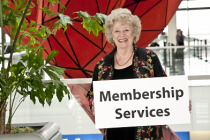Make a family earthquake plan
Many Californians live near an active earthquake fault. Although most of the state’s residents will safely live out their lives without experiencing any detrimental effects of a quake, planning and preparation for a natural disaster is considered a good investment in peace of mind.
The first 72 hours after an earthquake are critical. Electricity, gas, water, and telephone services may not be working. In addition, public safety services such as law enforcement and fire departments may be busy handling serious crises. You should be prepared to be self-sufficient and able to live without running water, electricity, gas, and telephones for at least three days following a quake.
KNOW YOUR ENVIRONMENT
During an earthquake stay away from heavy furniture, appliances, large panes of glass, shelves holding heavy objects, and masonry veneer such as the fireplace. These items tend to fall or break and can injure you. Usually, a hallway is one of the safest places if it is not crowded with objects. Kitchens and garages tend to be the most dangerous. Also, know the safest place in each room. It will be difficult to move from one place to another during a severe earthquake. Always know the possible ways to exit your house and workplace in emergency situations. In addition, know the location of the shutoff valves for water, gas, and electricity, and how to operate the valves. If you are not sure, contact your utility company.
MAKE SPECIAL PROVISIONS
Stock up on at least a three-day supply of food, water, clothes, medical supplies, and other necessary equipment for everyone in your family and make sure everyone knows where to find them. Decide where and when to reunite your family should you be apart when an earthquake happens. Choose a person outside the immediate area to contact if family members are separated. Long distance phone service will probably be restored sooner than local service. Keep a cell phone with you, if possible.
ELDERLY, DISABLED, OR PERSONS UNDER MEDICATION
Develop a “buddy” system with family, friends, neighbors, and coworkers. Plan how you will help each other in an emergency. If you live alone, you may wish to give your buddy a key to your home. Make a list of your medications, allergies, special equipment, names, addresses, and telephone numbers of your doctor, pharmacy, family members, friends, and any other important information. Give a copy to each buddy and keep a copy with you at all times. Eliminate hazards in your home. Securely anchor medical equipment, heavy appliances, bookcases, hanging plants, and other items. Place heavy objects on low shelves. Move beds away from windows. Check hallways, exits, doorways, and other areas, and remove hazards and obstructions, which may impede your safe exit after an earthquake. Install security nightlights to provide emergency lighting if power is interrupted.
GATHER EMERGENCY SUPPLIES
Assemble a 72-hour emergency supply kit, which includes water, any special diet foods, sanitary aids, cooking and eating utensils, flashlight, radio, blankets, a change of clothing, and a whistle for signaling for assistance. Include a well-stocked first aid kit with extra prescription medications and an extra pair of glasses. Store extra batteries for hearing aids, wheelchairs, and other battery-operated equipment. Keep a mini survival kit in your car. If you are deaf or hearing-impaired, keep a battery operated television on hand, with fresh batteries, for receiving emergency information if power is out. Store flashlight, pencil, and pad for communicating. Arrange for hearing friends or coworkers to relay information broadcast by radio. If you are blind or have impaired vision, keep extra canes in strategic areas around your home. Plan alternate evacuation routes from home and office. Store extra pet food and supplies for your guide dog.
PERSONS WHO DON’T SPEAK ENGLISH
People who cannot speak English often rely on their family or friends for information. If they are separated during an earthquake, they may need help. Prepare emergency cards written in English indicating identification, address and any special needs.
PETS
Store enough food and water to last for 72 hours, preferably for one week. Prepare a shelter or evacuation kit for your pet, including an unbreakable dish, veterinarian records, a restraint (leash or pet carrier) and medication with instructions. Keep your pet’s ID tag up to date and make sure nothing can fall on your pet. Finally, arrange for a neighbor to take care of your pet if you are not able to get home after an earthquake. Be patient with your pets after a quake. They get stressed just like people and need time to readjust.
KNOW COMMUNITY RESOURCES
Know the locations of the nearest fire and police station now, before a crisis begins. After a damaging earthquake, emergency shelters and temporary medical centers will be set up in your community. Contact your local Office of Emergency Services to find out the plans for your area. Know your neighbors and their skills; you may be able to help each other after an earthquake. Also know where to go to help your community after a disaster. It may be a matter of days before outside emergency assistance arrives. It is important to help each other.
PLAN TO MEET
Make a plan on where and how to reunite family members. Choose a person outside the immediate area to contact if family members are separated. Long distance phone service will probably be restored sooner than local service. Remember, don’t use the phone immediately after an earthquake, and make local calls only for emergencies. Know the policies of the school or daycare center your children attend. Make plans to have someone pick them up if, after an earthquake, you are unable to do so. There will be many things to take care of after an earthquake. Make a plan with your family, friends, and neighbors assigning specific responsibilities to each person. It may be difficult to get around after an earthquake, so each person’s task should be related to where he/she may be.
SPECIAL TIPS
Individual and family preparedness * Know the safe spots in each roomunder sturdy tables, desks, or against inside walls. * Know the danger spotswindows, mirrors, hanging objects, fireplaces, and tall furniture. * Conduct practice drills. Physically place yourself and your children in safe locations. * Learn first aid and CPR (cardiopulmonary resuscitation) from your local Red Cross Chapter or other community organization. * Decide where your family will reunite if separated. * Keep a list of emergency phone numbers. * Choose an out-of-state friend or relative whom family members can call after the quake to report whereabouts and conditions. Home preparedness * Learn how to shut off gas, water, and electricity in case the lines are damaged. * Secure water heater and appliances that could move enough to rupture utility lines. * Keep breakable and heavy objects on lower shelves. * Secure hanging plants and heavy picture frames or mirrors (especially those hanging over beds). * Put latches on cabinet doors to keep them closed during shaking. * Keep flammable or hazardous liquids such as paints, pest sprays or cleaning products in cabinets or secured on lower shelves. * Maintain emergency food, water, and other supplies, including medicine, first aid kit and clothing. Community preparedness * Suggest that local organizations of which you are a member undertake a specific preparedness program or acquire special training to be of assistance in the event of a damaging earthquake. * Organize a neighborhood earthquake preparedness program. * Conduct training for neighborhood residents in preparedness, first aid, fire suppression, damage assessment, and search and rescue. * Develop self-help networks between families and neighborhood through a skills and resource bank, which includes a listing of tools, equipment, materials and neighborhood members who have special skills and resources to share. * Identify neighbors who have special needs or will require special assistance. * Have neighbors agree to hang a white flag out after the quake if everyone and everything is OK. This information, and more, can be accessed through the Governor’s Office of Emergency Services, California Earthquake Preparedness, www.oes.ca.gov/CEPM2001.nsf/htmlmedia/resources.html.






